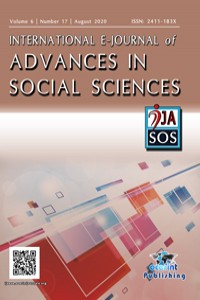Abstract
In every given nation, particularly those of Africa, with strong tribal affiliations, different groupings exist as tribes with their peculiar languages and dialects, amidst totality of the culture that unifies as a people. With the advent of colonialism, a change occurred as some of these tribes scattered about and could no longer be grouped together as one indivisible entity/nation. Among the affected tribes affected were the Yoruba in the western part of Nigeria, with its sub-groups like the Ondos in present day Ondo state, having migrated from the old Oyo Empire. This research traced the historical links of the Ondos in Ondo Kingdom including their culture, settlement, influences and socio-political organizations which stand them unique. The research deemed searchlights into its organized traditional political structure with a comparative survey of the modern Nigerian political practice of federalism and seeing how the indigenes of Ondo Kingdom have been found to be very efficient and efficient bureaucrats and technocrats, both in the public sector and private industry. A descriptive, analytical- method of exploration was used to accounts for the origins and socio-political influences of the Ondo people. The paper appraises the distortions of facts about the people’s history and descent, while, seeking clarifications for consensus reached by social sciences scholars and historians, using the comparative analysis approach. Findings confirmed that the Ondo indigenes are a group of Yoruba, whose mother, the favorite wife of the Alafin Oluaso called “Olu”, was sent away from the palace some six centuries back after birth of a twins to prevent their slaughter, since it was an abomination to have such a mysterious birth at that time in the empire. The research confirmed that the Ondos, emerged as very industrious and assertive sub-group of Yoruba and descendants of Lamurudu the father of Oduduwa, with their industrious nature in industry, agriculture, government and education. Ondo People
References
- Omotosho, O. F., Ologbenla, D. K. and Omotosho, O. A. (2016). What Has Changed in Our Land: “A Critical Assessment of the Extinction of Indigenous Yam Crop in a Rural Okeigbo Community in Ondo State of South-Western Nigeria”. An Article already accepted for a Peer Review Journal Publication.
- Please see, Article in Journal of Religion in Africa 22(3): 279-280. December, 1991. DOI: 10: 1163/157006692X00266
Abstract
References
- Omotosho, O. F., Ologbenla, D. K. and Omotosho, O. A. (2016). What Has Changed in Our Land: “A Critical Assessment of the Extinction of Indigenous Yam Crop in a Rural Okeigbo Community in Ondo State of South-Western Nigeria”. An Article already accepted for a Peer Review Journal Publication.
- Please see, Article in Journal of Religion in Africa 22(3): 279-280. December, 1991. DOI: 10: 1163/157006692X00266
Details
| Primary Language | English |
|---|---|
| Journal Section | Research Article |
| Authors | |
| Publication Date | September 14, 2020 |
| Submission Date | May 26, 2020 |
| Published in Issue | Year 2020 Volume: 6 Issue: 17 |
Contact: ijasosjournal@hotmail.com
The IJASOS Journal's site and its metadata are licensed under CC BY
Published and Sponsored by OCERINT International © 2015- 2025

